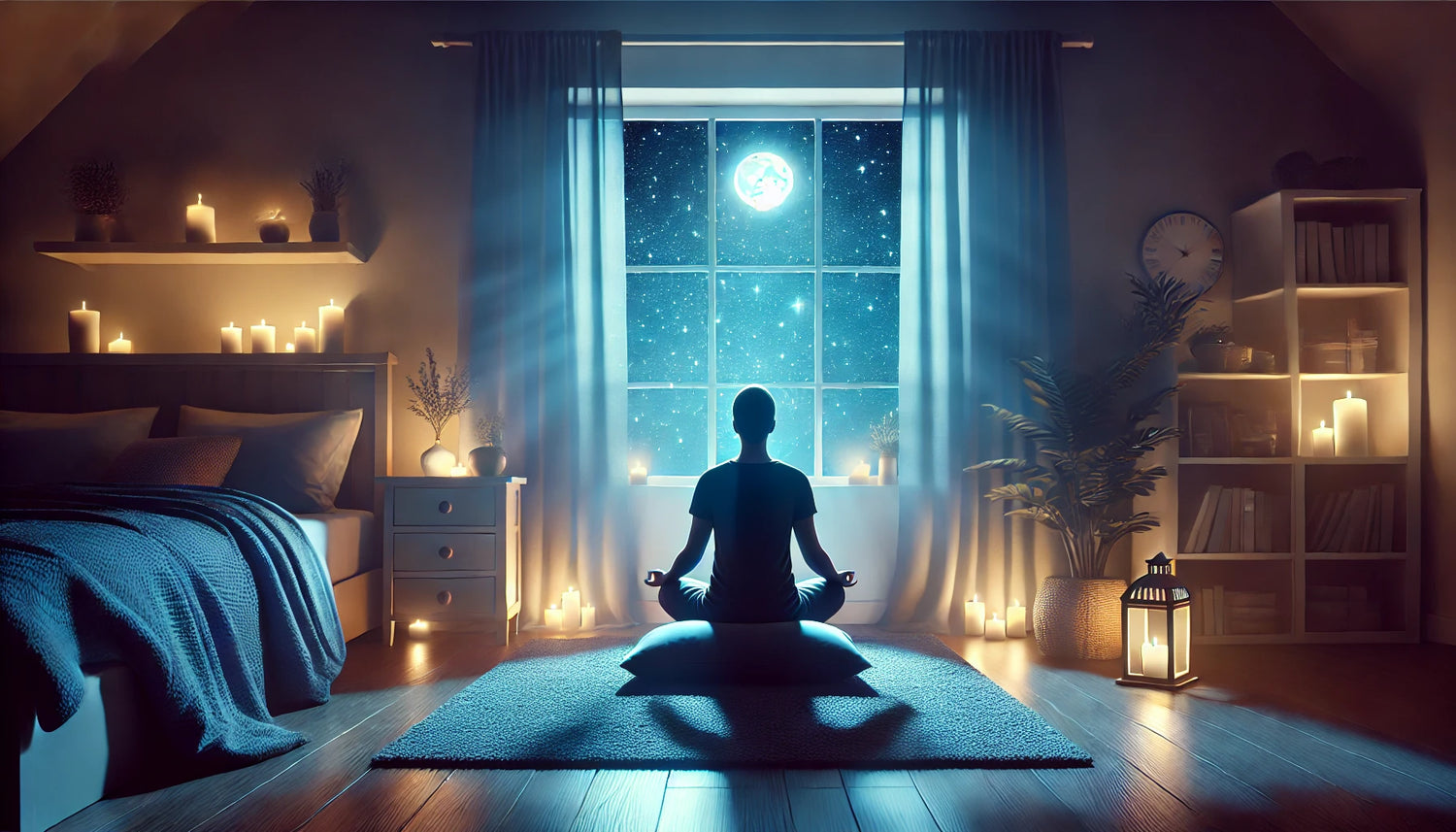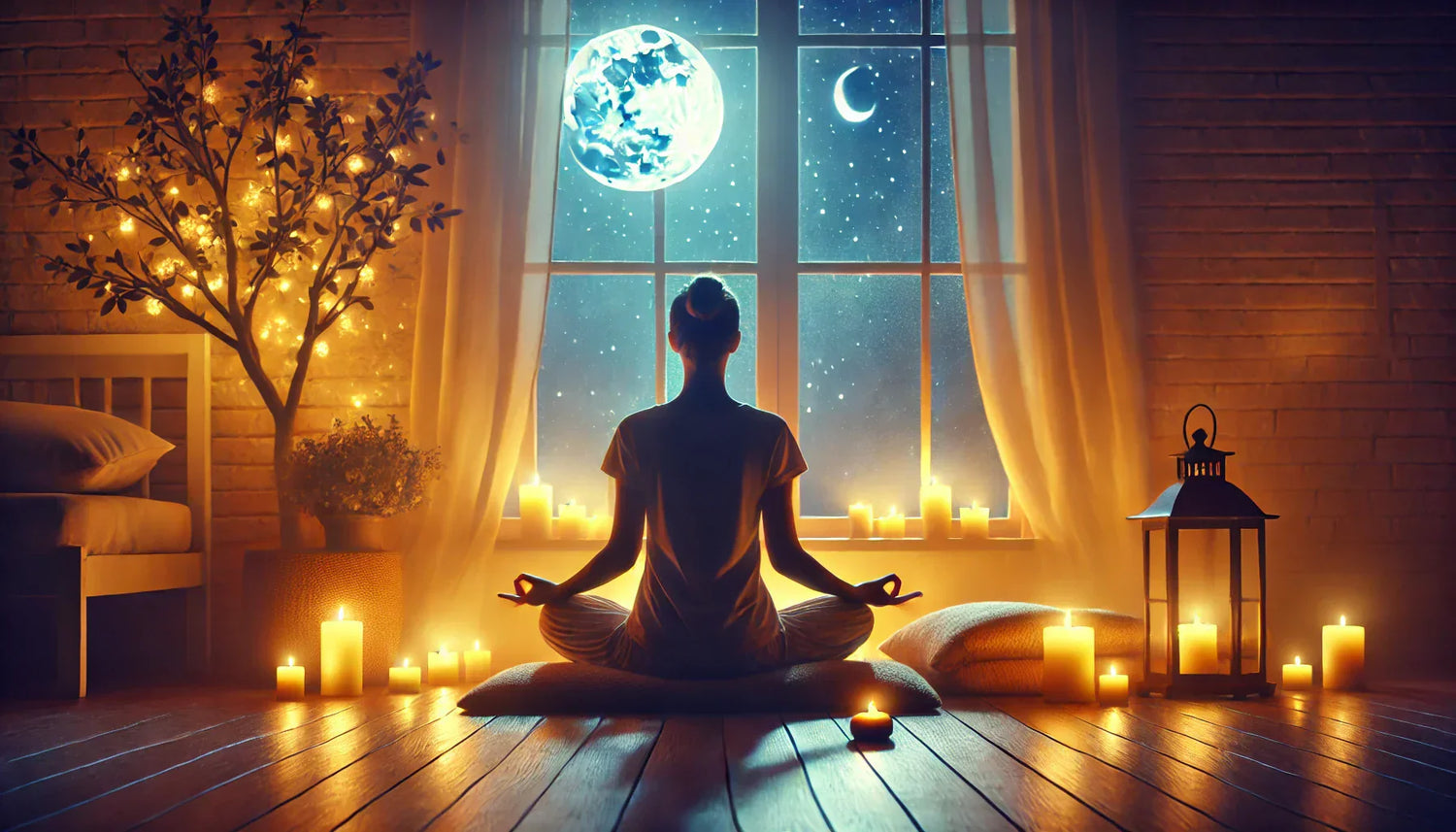What if the key to restful sleep was hidden in the calm of your mind?
Nowadays, sleep disorders have become a major concern. Insomnia, nighttime awakenings or even difficulty falling asleep can have considerable repercussions on health. Faced with this growing problem, many people are turning to pharmacological solutions or stress management strategies. However, an increasingly popular and natural approach is gaining recognition: meditation.
I. The consequences of insomnia
The physical consequences of insomnia
Insufficient or poor quality sleep contributes to:
- an overproduction of hormones such as cortisol responsible for metabolic disorders such as an increase in blood pressure,
- a disruption in glucose metabolism , which can lead to type 2 diabetes,
- obesity due to increased levels of bad cholesterol.
In addition, during sleep, our body activates different types of cells that play a role in maintaining our immunity, including T lymphocytes responsible for fighting the presence of infectious agents. But, in the case of insomnia, this transmission of information is not done correctly. Our immune system is then threatened and weakened.
Finally, insomnia causes physical fatigue . This exhaustion can lead to drowsiness and cause dangerous behavior (road accidents for example due to lack of vigilance). But also a decrease in professional or academic performance.

The psychological consequences
Chronic sleep deprivation can disrupt the delicate balance of neurotransmitters in the brain‚ affecting thinking, judgment and behavior.
People with insomnia are more likely to develop mental health problems ‚ such as:
Insomnia can lead to withdrawal, disruption of social relationships and aggression.
Dopamine, associated with motivation and reward, is also affected, which can lead to decreased focus and motivation.
Other brain activities may be disrupted such as memory, concentration and learning leading to impaired cognitive abilities.
II. The benefits of meditation
Meditation, which is widely democratized today, brings many benefits that have been proven by science. It can increase brain activity in areas associated with mental clarity (decision-making) .
Reducing stress and anxiety
During meditation, we observe:
- a decrease in the activity of the sympathetic nervous system . It is responsible for increased heart rate and blood pressure in times of stress.
- a decrease in the release of hormones such as cortisol.
At the same time, the parasympathetic nervous system, which initiates rest and relaxation, is underway.

Improving sleep quality
Meditation plays a vital role in improving sleep quality by acting on multiple levels.
By promoting a state of deep relaxation, it soothes the parasympathetic nervous system, often responsible for the stress response.
This process reduces levels of the stress hormone cortisol and slows down bodily functions, such as heart rate and breathing . This physiological relaxation creates an environment conducive to falling asleep quickly and getting a restful sleep.
III. 5 meditations to fight insomnia
The goal is to focus on yourself, forget about external disturbances and above all, relax. Preparing for meditation is a key step.
Lying down or sitting, you will need to find the most comfortable position, be dressed appropriately in a calm atmosphere to choose the meditation that suits you best.
Cover yourself if you are cold, or on the contrary, remove an item of clothing if you feel the need.
Mindfulness meditation
Mindfulness meditation involves paying loving, non-judgmental attention to the present moment .
By focusing on your breathing, bodily sensations or surrounding sounds, you can calm your mind and reduce intrusive thoughts that can disrupt falling asleep .
This regular practice helps reduce stress and anxiety , creating a foundation conducive to restful sleep.
The buzzing of the bee pranayama
Pranayama is a discipline of yoga that focuses on breath control . The bee humming technique, or Bhramari pranayama, involves producing a sound resembling the humming of a bee when exhaling.
This sound vibration soothes the nervous system, reduces stress and promotes a state of deep relaxation, making it easier to fall asleep .

The Neiguan
Neiguan, also known as P6 acupuncture point, is located on the forearm, about three fingers from the base of the palm. Stimulating this point with gentle pressure can help calm the mind and relieve insomnia .
This technique, derived from traditional Chinese medicine, is known to harmonize the flow of energy and promote better quality sleep .
Visualization
Visualization is a meditation technique that involves imagining calming scenes or serene places to induce a state of relaxation . By focusing on positive mental images, we divert our minds from daily concerns, making it easier to fall asleep.
This method is especially effective for people whose minds tend to be hyperactive at bedtime.
Tantra on the body
Body tantra is a meditative practice that involves a deep awareness of one's own body . By focusing on physical sensations, exploring each part of the body with attention, one develops an intimate connection with oneself. This body awareness helps to release muscular and mental tensions , thus creating a state conducive to sleep.
These meditation techniques can be combined with other solutions to combat insomnia.
Other solutions against insomnia
Other natural remedies for insomnia provide soothing, relaxing benefits in addition to meditation.
Natural solutions against insomnia
Plants such as valerian, linden and hawthorn are often used for their sedative properties .
They can be consumed in the form of herbal teas , capsules or liquid extracts.

Find peaceful and restful sleep with our Sleep Duo!
This natural supplement promotes falling asleep and reduces nighttime awakenings.
Discover the Sleep Duo!
Using essential oils, especially lavender and marjoram, can promote relaxation and improve sleep quality . These oils can be diffused into the air or added to a warm bath.
Homeopathic remedies such as Passiflora incarnata 5 CH granules are also recommended to help with falling asleep.
Lifestyle changes to combat insomnia
Reviewing your daily habits is more effective than various treatments.
Establishing a regular sleep routine, avoiding screens before bed, and creating an environment conducive to sleep (dark and quiet bedroom) are important measures.
A balanced diet, rich in minerals such as magnesium, can also play a role in sleep quality . Avoiding heavy meals high in fat and caffeine and/or any stimulants in the evening is strongly advised.
The sleep cycle is part of this wake-sleep alternation which regulates the production of cortisol or melatonin over 24 hours but also many other functions of the body such as digestion, appetite, growth, body temperature and immunity.
In the event of sleep disorders, several functions of the body will be negatively impacted, leading to significant dysfunctions which can be serious in the medium and long term for physical and mental health.
If the problem persists, medical advice is required.
Meditation, through introspection, teaches one to pay deliberate attention to one's thoughts and emotions, without judgment or reactivity . This gives one the opportunity to step back from anxious thoughts , making them less intrusive and less alarming.
Meditation induces physical relaxation , mental calm , and favorable emotional states such as affection and evenness of mood.







